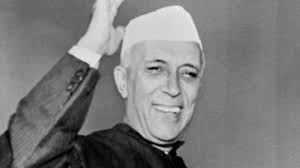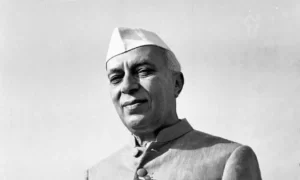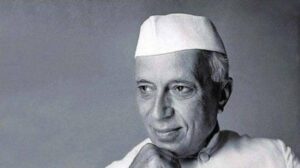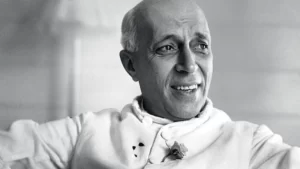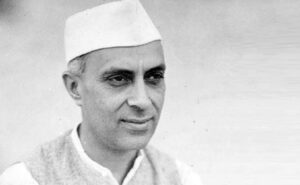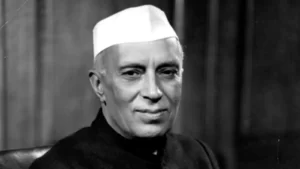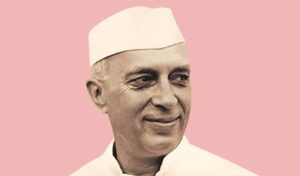Planning the Villages
A time comes when a whole people become full of faith for a great cause, and then even simple, ordinary men and women become heroes, and history becomes stirring and epoch-making.
We say that our aim is a socialist pattern of society. That is no doubt our aim, and that is the only aim which ultimately any civilized society must have. It is not a domestic socialism but something which affects the whole community, helps all the people. in the country to raise their level of living and reduces the big differences that may exist. Today there is, in India, a certain vulgarity about the difference in people’s standards, there are the very well-to-do and the very poor. It is inherent in the circumstances. You cannot get rid of that by simply cutting off the head of the tall people. You want people to grow. you do not want to shorten all of them.
Planning is essential not only for present but also for the future, that difficulties do not arise later….I agree that planning for India’s countryside of about 300,000 villages is far more difficult than for instance, u steel plant. The former means largely making the people do things by themselves, although government organisation would be there to assist them.
The Community Development Movement in India started six and a ver 300,000 villages. This is half years ago and now covers over remarkable advance and I think that it will produce and, to some extent, is producing revolutionary results in the country. I know well its failings, but its successes are even more obvious. Effective results will depend on the measure of the people’s association with it.
When you are planning for, let us say, our countryside with 500,000 or more villages, it is far more difficult. When you are planning for improving 440 million people, it becomes a big job because ultimately it means raising them and making them do things for themselves.
Nothing really mattered in India that could not be measured in terms of the village.
I like the city to approach the village and the village to approach the city.
In India, one thing forces itself on us, and that is the problem of raising the level of living of vast masses of people by giving them. first of all, the absolute necessities of life…. Our task is first of all to provide the basic necessities of life…to our people, like food. clothing, housing, education, health and work. It is work that produces all those things.
We have to lay great stress on people who do not even have the desirable minimum standards of living today.
Communism comes in the wake of this disillusionment and offers some kind of faith and some kind of discipline. To some extent it fills a vacuum. It succeeds in some measures by giving a content to man’s life. But in spite of its apparent success, it fails partly because of its rigidity but, even more so. because it ignores certain essential needs of human nature.
I have felt that from the point of view of balanced development, we have to lay greater stress on many small industries in our villages, make them slightly urbanized, lessen the gap between them and the urban areas and increase the facilities available to the people who live there, instead of concentrating on the towns and cities and drawing out people from the villages. thus creating problems in the cities.
Agrarian reform is basic to every plan. What is the good of an institution for a few persons here and a few persons there when millions of people in the rural areas do not have life worth living? This is the basic problem. Other problems are there, of course, that of industrial workers and such other problems. But, in India, the basic problem still remains agrarian.
There can be no doubt that vast numbers of the peasantry today in India are undergoing this change of outlook as they use new tools and experiment with new methods of agriculture. Even the coming of the bicycle in large numbers to the villages of India is not only a sign of higher standards, but is a symbol of new and changing attitudes. Agriculture and industry must be regarded as integral parts of the same process of development.
The fundamental problem of India is not Delhi or Calcutta or Bombay but the villages of India, and something has to be done to raise the level of life in villages…. We want to urbanize the village, not take away the people from the villages to the towns. However well we may deal with the towns, the problem of the villages of India will remain for a long time and any social standards that we seek to introduce will be judged ultimately not by what happens in Delhi but in the villages of India.
Schemes are both meant for the rural areas and I think that they are probably the most revolutionary thing that is happening in India these days. Large masses of people, hundred millions of them, are changing and working together, getting a new sense of self-reliance and faith in their own work.
There is, of course, a certain conflict between the interests of urban people and between the interests of the rural masses. This has always been so in history. But the conflict grows less and less as rural areas develop and as industries are spread out. That is also. why we believe in a large measure of decentralization. I don’t mean at the expense of things which, inevitably, have to be centralized; not at the expense of higher techniques. But we believe in decentralization, in more village industries, in cottage industries to balance the heavy ones which grow up elsewhere in the urban areas.
The villages are being deprived of their bright persons who go to the cities, leaving the villages rather weak and without any educated or trained persons to help them. You may state the problem in a different way.
We want to urbanize the village, not take away the people from the villages to the towns that are growing up, but to bring certain urban standards to the village, and keep the bright persons of the village in the village itself.
The Grassroots
Now that you have come into the larger freedom you have to remember the obligations and the responsibilities of that freedom. You have to remember that democracy means co-operation. It means adjustment, it often means compromise of different viewpoints, and it means avoidance of conflict. We are not going to build anything through conflict and violence.
There is no right without a corresponding responsibility and obligation. We claim rights, but we forget the obligations that accompany the rights and such rights will not be a blessing to us, and may even be a curse.
In any State, and, more especially in a democratic State, the psychological appeal to the people is important. They have to feel that they are partners in the great enterprise of running the State machine.
We treated everyone as a human being, with a right to say what his. Government should be. So we put our faith in democracy to the fullest extent. And democracy only flourishes, as freedom only flourishes, when the responsibilities of freedom are understood and carried out. If the responsibilities are not understood and carried out, then freedom itself tends to slip away.
Development plans reflect the changes which are taking place in the country’s economic and social structure as well as the directions in which this structure has to be reorganised and strengthened. In a democracy the pace of change depends to a large extent on increase in public understantling and in public response and on the growth of a scientific outlook on the part of large numbers of people. Besides the economic and social objectives, the educational aspects of planning are, therefore, of great importance.
Panchayati Raj
A recent development of the community development movement in the rural areas has been, what is called. Panchayati Raj. or democratic decentralisation. At the village, bloc and district levels responsibility for development is entrusted to Village Panchayats, Panchayat Samities and Zila Parishads, and they are given consider able powers. This is a revolutionary change in the structure of administration within the district and in the pattern of rural development, and is already producing significant results and changing the rural climate.
I think we are gradually changing our men in rural areas as a result of many years of Community Development. Therefore, we have now introduced what we call Panchayati Raj. Groups of villages have been given a great deal of authority and resources. The taxes. they pay are returned to them and village-elected councils deal with them. We look upon this as a tremendously educative process.
The whole object behind the Community Development Movement and the Panchayati Raj is to create opportunities for human beings to grow, to be able to think, to be able to act, to be able to co-operate with each other and act together.
This problem of social welfare might be looked at in many ways. Essentially, I submit, it has to be the point of view of the villages and the towns. Even if a small advance is made per capita in a village, in the totality it will amount to a big advance.
We have now in most States vast numbers of panchayats. If these panchayats could be drawn into the network of planning and its implementation, that would bring the plan to the doorstep of the villager.
In some parts of the country, as in Punjab, it is very far advanced. In fact, parts of Punjab are today right in the middle of the industrial revolution-both in agriculture and industry. You can see it with your own eyes. Curiously enough, no big plants have been put up in Punjab. There are only small industries. People put them up. Government has helped them sometimes.
I am quite sure that if the Panchayati Raj institutions flourish properly. everything else. including the top institutions, all your State Assemblies and your Parliament. will function rightly. They are the base, and if the base is strong, the upper structure will largely be conditioned by it But if the base itself is not good, then we do not make much progress, Ultimately, the improvement of that phase will come about through education.
In future we should evolve some method of making the smallest unit in the village feel that it is consulted in regard to his particular problems and is thus helping in evolving or in varying the plan. This is still more necessary in implementing the plan. The official approach. though necessary, is not enough and has to be linked with this non-official approach and widespread attempt at co-operation.
We want the people to have the sensation of doing things for themselves.
Local Self Government
The primary object of municipality should be to create happiness and prosperity in the city, and that should be the ideal of every municipal council. They should give as much cultural and educational facilities as possible. It was the duty of municipal administration to see that every man in the municipality had a home, and if there was a single individual without a home, it was the fault of municipal administration.
But situated as we are the municipality cannot go very far or do much. Political conditions must change and power must come into the hands of the people. Municipal work is important. Much can be done under favourable circumstances.
In our Local Self-Government we see the grass roots of community life. I would wish that all our legislators who come up to Assemblies and Parliament are made to serve for some time in this type of Local Self-Government before they are allowed to stand for higher bodies. That would give them knowledge and experience, and in every way it will give them good training. Whichever way we look at things, the importance of this foundation is very great, whether it is in the rural or in the urban areas.
Local administration is the foundation of our democracy and very rightly it is so. A democracy at the top cannot be a success until the foundation on which the superstructure rests is strong. It is no use starting such a super imposed democracy without a proper base.
Local self-government is, and must be, the basis of any true system of democracy. We have got rather into the habit of thinking of democracy at the top and not so much from below. Democracy at the top will not be success unless it is built on this foundation from below.
It was with this view, more specially, that the Community Development Movement in India was started. Community Development deals with the villages the rural population. It has been doing much good, but, still, as it often happens in India, things fall into a rut. We all get into a rut. Prime Ministers get into a rut, everybody gets into a rut. The early dynamism of the Community Development Movement became rather spread out.
Municipai administration covered a wide field of activities, and it was highly essential that one should study the various problems of a municipality. The activities of municipal administration included not only sanitation, but also cultural and other sides of public life, and what was necessary was a standing programme of activities. Nothing would result from a vague and unsettled programme, and the question was how would they be able to draw up a definite programme of activities?
You must remember the test of municipal work is judged by the houses and conditions of the poor and not the few mansions of the rich. But unfortunately municipal money goes mostly towards providing more conveniences and comforts for the rich. As long as it does not do something to remove the sorrow and the wretched conditions of the poor, it shows it has failed.
Some gentlemen have imagined that my position in the Board (Allahabad Municipal Board) would facilitate their entrance to a land flowing with milk and honey. Chits and recommendations have been brought to me from friends and attempts have been made to influence me in favour of varous applicants. I have no doubt that every other member has a similar tale to tell. The Executive Officer has made the same complaint to me. There is evidently an impression amongst some people that the Board is a charitable. organisation meant to supply soft jobs to the needy and the deserving, and asylum for the halt and the lame who have failed in the battle of life and who now seek shelter under the hospitable roof of the municipality.
The social services provided by Indian municipalities are few enough, but even these are curtailed where there is financial stringency, and usually the first to suffer is education. The ruling classes are not personally interested in municipal schools; their children go to more up-to-date and expensive private schools; often receiving grants-in-aid from the state.
All large municipalities in India or the West have to face the problem of the division of responsibility between experts and popular representatives. Municipal administration is becoming more and more complex and the expert is gradually coming in to guide if not to control the activities of every department. Apart from matters requiring technical knowledge, it is felt that special experience is required for municipal administration and mere “common sense” is not enough.
It is now a recognised principle that social welfare work is a primary concern of a municipality. Municipalities are not only supposed to provide adequately for education but also for cultural and recreational facilities, for sanitation, housing etc.
Water supply for villages is even more important than for the towns and important cities. It is astonishing that there are still areas in India where good water is not available and men and women specially have to go long distances to fetch a little water.
Good water and clean surroundings will probably do more for the health of the country than all the medicines and other things that you may import or manufacture here. So I would suggest you making a special effort to ensure such things.
So the choice has to be made ultimately by the planner-it is a difficult choice between projects which are important basically and which will lead to further growth but which will not immediately bring relief to the people and some projects which will bring relief to the people much sooner. There are some things which the people must have at all cost. I mentioned an obvious example-water Every village must have good drinking water. There are many other needs too, like electricity.
Therein comes the role of the so-called organized authority, whether it is Government or Corporation or Municipality or Panchayat, or whatever it is. In order to do that, we constitute this organized authority from those elected by the people. It casts responsibility on the people. That is the democratic method.
In the city there are many areas which are covered at present by dilapidated huts with not a single pucca house. These areas can be easily acquired and would prove to be remunerative schemes. A number of such small schemes and the provision of decent houses for the poor and small playing grounds and open spaces would increase the amenities of life for a large number of people in the city.
A poor man, a starving man, is a disgrace to a municipality. It is not good for the municipality to say that we have no money to do this or to do that.
I think it is the essential function of a municipality to see that there is no unemployment. If you cannot fulfil this function, it must be understood that something is wrong either in the municipality or in the social structure under which it functions. But it is absurd for me to blame the Calcutta Corporation for this. Today it is a vast problem and the problem is not within its control. But the modern ideal of a municipality is that there should be no unemployment, that there should be no unhealthy human beings in the city. A municipality should build up educated and useful citizens who can do a great measure of real work. If that is the idea of a municipality how very far we are from it.
Octroi is not a very desirable source of revenue. It is always a nuisance and may sometimes become a serious hindrance to trade.
There is already a tendency in Allahabad amongst a number of traders to adopt underhand methods in order to avoid the payment of octroi.
The present method of charging a tax on house values is not a desirable one. It results in plots lying vacant for years. The tax should be on land. This will be fairer and will prevent speculation in plots. There would also then be an inducement for building houses. This is not primarily a matter for the Trust but if such a tax was imposed in place of the house tax it would benefit both the Trust and the municipality.
To equalise the burden a little and to encourage improvements, 1 wanted to introduce a tax on land values. But hardly had I made the suggestion when a protest came from a Government official, I think it was the District Magistrate, who pointed out that this would be in contravention of various enactments or conditions of land tenure. Such a tax would obviously have fallen more heavily on the owners of the bungalows in the Civil Lines.
There should be a tax on land which should always be payable whether there is a house or not and whether the house is occupied or not. This might be the splitting up of the present house tax into two parts: the land tax and the house tax.
Municipal Functions/As they ought to be
Whatever the reasons, the fact remains that our local bodies are not, as a rule, shining example of success and efficiency, though they might, even so, compare with some municipalities in advanced democratic countries. They are not usually corrupt; they are just inefficient, and their weak point is nepotism, and their perspectives are all wrong. All this is natural enough; for democracy to be successful, must have a background of informed public opinion and a sense of responsibility. Instead, we have an all-pervading atmos phere of authoritarianism, and the accompaniments of democracy are lacking. There is no mass educational system, no effort to build up public opinion based on knowledge. Inevitably public attention turns to personal or communal or other petty issues.
I have felt that the physical and mental development of the young should be the special care of the state and the Municipality and in this respect we might well take a leaf out of the book of Soviet Russia.
Local Self-Government and Town Planning is of high importance because it sets the framework in which work can be done. We have the Panchayati Raj. The concept behind Panchayati Raj has attracted us and we have given it the utmost importance because the test of success in India is not the construction of a few buildings but how human beings grow.
The municipal work was everybody’s work and all should help but nobody cared and that was the cause of all troubles.
India is committed to the democratic ideal. For the first time in history we were brave and courageous enough to give the vote to hundreds of millions of people of India. We gave the vote to the dwellers in the jungle, even as to the dwellers in the cities. We did not deny the vote to any person in India.
Introduce national spirit in the municipal administration.


